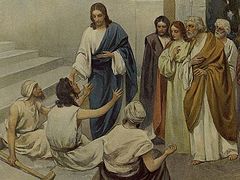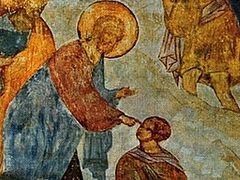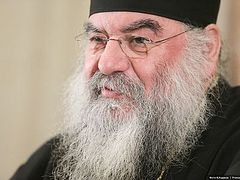Another prophetic sermon by the great elder of the Pskov Caves Monastery, Archimandrite John (Krestiankin).
 My friends, the day is nearing when the joyful greeting, “Christ is Risen!” with which we meet each other will yield its place to our everyday greeting. And only once a week will the Church services and calendar remind all the living of the Resurrection of Christ, of the meaning and aim of life, of the resurrection of the soul in God. For six weeks after Pascha the Sunday Gospel offered to our attention and contemplation the profound and edifying stories of the different souls’ steps onto the path of salvation.
My friends, the day is nearing when the joyful greeting, “Christ is Risen!” with which we meet each other will yield its place to our everyday greeting. And only once a week will the Church services and calendar remind all the living of the Resurrection of Christ, of the meaning and aim of life, of the resurrection of the soul in God. For six weeks after Pascha the Sunday Gospel offered to our attention and contemplation the profound and edifying stories of the different souls’ steps onto the path of salvation.
My Lord and my God! called out the holy apostle Thomas, teaching us to seek our salvation only in the Savior, and also teaching us the sense of our own destruction, from which He Who Saves extricates us (Jn. 20:28). The Holy Myrrhbearing Women gave no sleep to their eyes nor slumber to their eyelids, serving their beloved Savior to the day they found Him Resurrected. And they, like Thomas, confessed their love for Christ and His salvation—not with their tongues but with their hearts.
Behold, thou art made whole: sin no more, lest a worse thing come unto thee, said the Lord to the paralytic, and so He tells us of the terrible, destructive work of sin on the soul and body (Jn. 5:14). Sin—darkness and the shadow of death—separates us from the Source of Life, from God. And only God’s mercy, which awaits our repentance and conversion, endures us and helps us turn away from death to life.
The Savior’s conversation with the Samaritan Woman teaches us to go from external attention to God’s word, to inner effort, to standing up for the truth.
And so, this Sunday, called the Sunday of the Blind Man, is the last Sunday before the leave-taking of Holy Pascha.
At first glance it is an at once simple and miraculous event—the granting of sight to one who was born blind; the granting of sight to a man who had never seen a ray of sunlight, never seen the beauty of God’s world. In our understanding, he was an unfortunate man, and a hopeless sufferer.
But judging from what was written in the Gospel about this man upon whom a divine miracle was wrought, he was strong and a courageous; he bore his handicap and woe without murmuring, for the Savior Himself testifies that his blindness was not the consequence of sin: Neither hath this man sinned, nor his parents:—and then the remarkable words—but that the works of God should be made manifest in him (Jn. 9:3).
And the power of God in simple actions, not portentous of any miracle, works a miracle. Where God so wills, the order of nature is overthrown.
Jesus Christ did what not one man born of earth could do—a man blind from birth received his sight, eyes locked up from birth were opened. But not only bodily healing happened for this sufferer—his eyes saw, and his spiritual vision immediately saw in Jesus Christ the Son of God.
News of what happened flew around the city in the blinking of an eye, unsettling minds.
Who is this Man Who has done something unheard of before? And the people were divided. For some, who saw the Healer as a Man of God—because a sinner cannot do anything like it, for “God heareth not sinners”, spiritual sight had come; and having been freed of spiritual blindness, they heard God’s call.
But others, who did not wish to see the miracle, saw in the Lord no more than a violator of the Sabbath. Hypocritical and ostentatious piety and pride rose up against what was obvious, and those who could see went blind; spiritual blindness distorted the world for them, and made it impossible to see the light of truth.
The main calamity of our times is in just this—people’s extraordinary spiritual blindness.
The sin of pride and self-satisfaction, the sin of cunning unbelief rose up against simplicity of faith, which clearly sees the truth. The Pharisees cast out the man who had received his sight. Book learning casts out true faith. And the Lord pronounces the words: For judgment I am come into this world, that they which see not might see; and that they which see might be made blind (Jn. 9:39). Since that time, God’s judgment has been wrought continually—also in our days, and over us.
Sometimes our sight is opened spiritually; but how often do we who are blinded by sin lose the ray of light—the light of Christ—and wander through life in darkness while considering ourselves able to see.
The main calamity of our times is in just this—people’s extraordinary spiritual blindness. Spiritual wisdom, which can clearly see the light of truth, is now becoming extremely rare. Fleshly reason, mired in the things of this life, loving only what is earthly, always leads to opposition against divine teaching and revelation.
Fleshly reason, mired in the things of this life, loving only what is earthly, always leads to opposition against divine teaching and revelation
In order to acquire spiritual wisdom, we need first of all obedience to the mind of Universal Orthodox Church. St. Ephraim the Syrian says, “Do not cease to test Divine Scripture on yourself, do not cease to ask your Mother, the Church.” The light of Christ’s teaching, the light of His love, enlightens every person in world. And love is that test according to which we are proved—whether we are blind or seeing, sick or healthy.
Let us recall the Savior’s words: If ye were blind, ye should have no sin: but now ye say, We see; therefore your sin remaineth (Jn. 9:41).
Sin gives birth to spiritual blindness, and spiritual blindness roots a person in sin. And the human heart becomes hardened and coarse. The ears hear, and the eyes see, but neither of them understand. And the sin of hardness of heart and stubborn opposition to the truth make a person a participant in the barren works of darkness. The voice of the heart fades out, and the cold, calculating, proud mind tramples upon Christian love. And finally man then goes blind. And God steps away.
Thus is God’s judgment wrought upon the stubborn “smarty”. God hath given them the spirit of slumber, eyes that they should not see, and ears that they should not hear, even unto this day (Rom. 11:8).
And so now, as always, today’s Gospel places us before the question: Who then are we? Are we healthy, or sick? Seeing, or blind? Are we in God, or has the spirit of the world led us away from Him to a land afar off?
Our dedication to Christ and His commandments is being tested throughout all the days of our lives—during days of outward prosperity, but more often during days of persecution and trials. We need to know the saving alphabet by heart, so that we could give an account to ourselves and others, and when necessary, give an answer—with conviction in the truth and unashamed.
The holy Orthodox Church is the pillar and foundation of truth! Nowadays specific forces are trying to shake this foundation, seeing in it the final barrier to their destructive plans. They are invading it, defaming its hierarchy, introducing the spirit of mistrust, conflict, and division. What militant theomachy was unable to do in its time is now being done by those who call themselves the guardians of faith and the canons.
Let’s look attentively at what Christ commanded us and to what these new zealots are calling us.
They are calling us to schism against unity in Christ. And in the places sanctified by the profuse, suffering blood of the Orthodox for the faith, they are raising new thrones, like for example the autocephalous Ukrainian church, or schismatic groups in Suzdal.1 The heresy of the Bogorodichny Center2 also proclaim their right to own the truth.
But is Christ divided (1 Cor. 1:13)? Now I beseech you, brethren, by the name of our Lord Jesus Christ, that ye all speak the same thing, and that there be no divisions among you; but that ye be perfectly joined together in the same mind and in the same judgment (1 Cor. 1:10).
Where is that all-forgiving, compassionate love to which followers of Christ are called? Where is the spirit of the early Church, when the multitude of them that believed were of one heart and of one soul (Acts 4:32)? Where is the spirit of Christ, calling to us from the most onerous cross of suffering to forgive not only those who have gone astray, but even our enemies?
Here is the test: Are we of Christ, are we true Christians, or have worldly powers seized us—the power of revenge, and the power of struggle without God.
In 1920, when the blood of the martyrs was pouring out and the Russian Church was ascending wearing its crown of thorns to Golgotha, its meek and faithful Patriarch, His Holiness Tikhon, called the children of the Church who were still alive to not be angry, not to despair, but to carry their cross without fear, and to arm themselves against their persecutors with love and repentance.
And the one who we now have no doubt is standing before the throne of God, says, “Let this holy guilelessness of the Church, these calls for patient bearing of antichristian enmity and anger seem like weakness … We beg you all not to depart from this only saving disposition of a Christian—do not step off the path of the cross sent down to us by God.” “It is the difficult but high task of the Christian to preserve in himself the great happiness of guilelessness and love.”
And another word from the holy Patriarch in those days when everything living was being destroyed: “It is no great achievement to die these days. Now it is harder to learn how to live.” The Russian people and the Russian Orthodox Church are learning. They are learning to this day, sacrificing very much in order to preserve what is most important—the Church, without which we cannot live.
Hundreds of martyrs have shone forth in the Church. And each one separately, offering themselves as bloody—or what is even more difficult, bloodless moral sacrifices—were all united in an indivisible spirit, faith, and love, following the desires and intentions of the Lord: that they all may be one; as thou, Father, art in me, and I in thee, that they also may be one in us… (Jn. 17:21). This is Christ’s prayer for all of those who are faithful to Him.
And so, seventy years later our Holy Orthodox Church must take upon itself a new kind of martyrdom.
We must all remember, my friends, to suggest the teaching of the holy fathers to those who are wavering. “We can have everything outside the Church—except for salvation. Outside the Church we can have the clerical rank, sacraments, and alleluia. We can have Liturgy, the Gospel, faith, preaching in the name of the Triune God—but salvation can only be found in the Orthodox Church.”
And let the words from the church ambo not sound out to us in vain: Now I beseech you, brethren, mark them which cause divisions and offences contrary to the doctrine which ye have learned; and avoid them (Rom. 16:17). God is the Judge of all who purposely or through ignorance have stepped upon the warpath against God.
We need to live and pray so that our struggle for Christ’s sake in these deceitful times be handed down as an inheritance and edification to the coming generations as the best testament and blessing. Only upon this rock—healing evil with good—is founded the invincible grandeur of our Holy Orthodox Church on the Russian lands.
This was the inheritance left to us by His Holiness, the Patriarch and Martyr Tikhon. By this shall all men know that ye are my disciples, if ye have love one to another (Jn. 13:35). This is the most important thing, which we must preserve under all circumstances. This is the measure of our spiritual vision.
This, my dear ones, is what I wanted to say to you today. Pain of heart speaks today through my lips. I have lived a long time, I have seen the history of the Church, I’ve seen what they are judging it for today with my own eyes.3 I saw and knew its hierarchs, I grew up at their feet. And I can’t forget the foundations that they placed in us, and how they themselves lived.
But God’s judgment is walking the earth. Man’s judgment is one thing, but God’s is another. May God grant that we not turn out to be spiritually blind and not depart from the truth in Christ. May we view the events in Church life, events in the life of our country in both the present times and the not-so-distant past with spiritual vision. And then we will see the many examples of how human calculations crumbled, how powerless before God’s Providence many years of wisdom, experience, scholarliness, and even spirituality perceived in a human way, were. Yes, in the present evil times, having swept aside all that is purely human, very much is being shaken to its foundations. Worldly wisdom is cracking apart, and it is becoming clear that God’s Judgment is coming; the human is being rejected and the divine is being given. And our faith and task are now one thing: to unfailingly abide on the path of Divine Providence, to give ourselves over to it undivided and without a second thought. “Even so, come Lord Jesus (Rev. 22:20), come through the grace of Thy Holy Spirit, so that in our weakness and through it Thy judgments may come to pass.” Amen.



